

Overcoming the Identity Crisis: An Interview with the Author of Leaving Academia. Checklists. UC Santa Cruz.
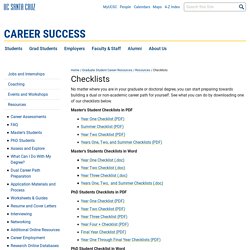
Resumes for Humanists. About Humanists@Work – Humanists@Work. 5 Reasons Your PhD LinkedIn Profile Is Not That Great. As a PhD in academia, I never thought I would need a LinkedIn profile.
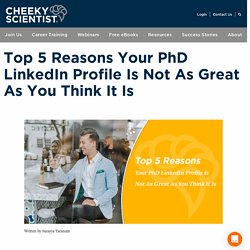
I was highly qualified and doing well with several publications. I did not think I needed the support of an online platform to move forward in my career. So when I became aware of LinkedIn during my PhD, I did not even create a profile on it. I simply did not like the idea of online networking. Researcher developers, HR specialists, careers advisors and trainers: how the Vitae RDF can work for you. Practical ways to use the Researcher Development Framework (RDF) for research staff development: Planning and providing professional development Mapping the RDF to your institutional provision at domain, sub-domain and/or descriptor level will enable you to:
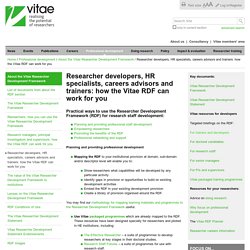
Employability lens on the Vitae Researcher Development Framework 2012. Frequently asked questions. Why has the Professional Development Framework been created and what is it?
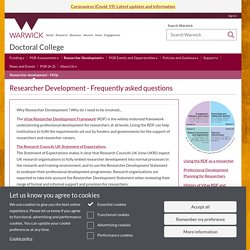
The PGR Professional Development Framework is a policy approved by Senate based on six key themes, and its structure is intended to introduce coherence across the institution, while recognising disciplinary differences. All postgraduate researchers should have fair and comparable access to professional development opportunities that will allow them to: identify and develop specific skills; acquire the knowledge and expertise to achieve standards of excellence in their research; be competitive in their professional life as they move into future employment or study. The Warwick Framework has been developed in line with the Research Councils UK (RCUK) expectation that all postgraduate researchers will have a minimum of ten days of professional development and skills activity, and that the provision of transferable skills should form a fundamental part of doctoral training. 3 Ways to Make Your Fellowship Application Resume Stand Out.
By Deborah Vieyra Constructing a fellowship application resume that stands out can be an incredibly daunting task.
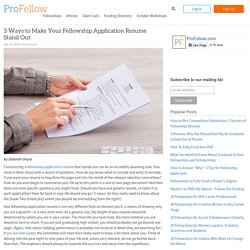
Your mind is likely abuzz with a swarm of questions. How do you know what to include and what to exclude, if you want your resume to leap from the page and into the minds of the relevant selection committees? How do you even begin to summarize your life up to this point in a one or two-page document? And then there are more specific questions you might have: Should you have one generic resume, or tailor it to each application?
Your fellowship application resume is not very different from an elevator pitch, a means of showing why you are a good fit—in a very short time. Job Families. PhD Student Career Planning Timeline. No matter where you are in your doctoral degree, you can start preparing to find a career or job after graduation.
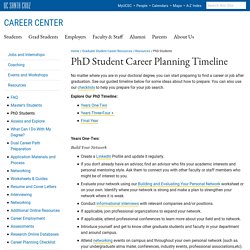
See our guided timeline below for some ideas about how to prepare. A Modern Language Association initiative. Resource: Transferable Skills and How to Talk about Them. By Stacy Hartman As a humanities PhD, you are likely more accustomed to talking about what you know than about what you do.
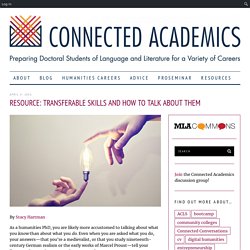
Even when you are asked what you do, your answers—that you’re a medievalist, or that you study nineteenth-century German realism or the early works of Marcel Proust—tell your listener what you know, not what you can do. When it comes to applying for nonacademic jobs, this can be a real hindrance. Most people outside the academy have only the vaguest idea of what humanities PhDs do, besides reading books and talking and writing about them. This is where transferable skills come in. The documents on this page will help. Watch all the presentations from Careers Live.
PhD Pathways Series. The PhD Pathways Series provides an “outside the academy” perspective on career preparation and opportunities across a range of skills, trends and industries.
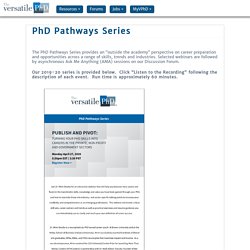
Selected webinars are followed by asynchronous Ask Me Anything (AMA) sessions on our Discussion Forum. Our 2019-20 series is provided below. TRESS ACADEMIC: improving academic performance. Researcher Academy - How Metrics Can Boost Funding. Personal Statement. Resume. Workgroup 4 Global Labour Market Developments. Professional development and careers activities Ph.D. students can pursue over the summer (opinion) {* #emailNewsletterEnrollmentForm *} {* signInEmailAddress *} Newsletters {* optInDailyNewsUpdate *} News, opinion and jobs in higher education - delivered each weekday.
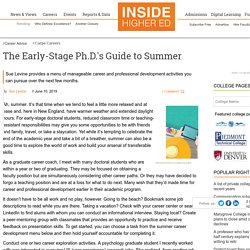
As a PhD Examiner … My Top 25 Tips for PhD students. I have done many MSc/PhD examinations, and I enjoy them so much.
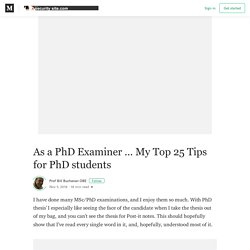
With PhD thesis’ I especially like seeing the face of the candidate when I take the thesis out of my bag, and you can’t see the thesis for Post-it notes. This should hopefully show that I’ve read every single word in it, and, hopefully, understood most of it. So here’s my top Ten 25 hints on how to help your examiner (many of these should also be relevant to MSc thesis’ too — to a student aiming at a 1st class Hons dissertation): Say up-front what the problem is, what other people have done, and how you have added to it. The Introduction chapter is the most important chapter of all, and you need to grab the reader, and tell them what the problem is, and how you have solved it. Oh, I stuck to 25, but there’s a few more: Living and working in Austria - academics.com. Welcome to Marie Skłodowska-Curie Actions.
10 career paths for phds. University Career Center. What’s next for the ‘Lost Generation’ of academics? Towards a sustainable academic system In academia, the ‘lost generation’ refers to mid-career scientists and researchers that, after completing many short-term contracts and temporary positions, find themselves largely excluded from research careers due to lack of opportunities for permanent positions.
This cohort often also experience difficulties in exploring career paths in other sectors in society, causing suffering and an enormous loss of human talent and financial resources. What are the main factors behind this issue, and how do we solve it? The ‘lost generation’ is an issue that resonates intensely with many people, as it is widespread and affect peoples’ lives deeply. However, very little has been done at the policy level, even though there have been recommendations to implement change both in the US and in Europe.
Academic CVs for PhD Applications. As part of a PhD application, or applying for any other position in research, you may be required to write an academic CV. A CV for a PhD student has several differences to a standard CV. This guide explains how to write a CV for academia. An academic CV is similar to a standard CV, and the same general guidelines and advice apply. Keep it professional, up-to-date, relevant, clear and concise. DYNS Single Page PDF Form. 10 Career Opportunities For Humanities PhDs. Written by: Cathy Sorbara, Ph.D. We talk a lot about STEM PhDs. Our search for an alternative career and the challenges it entails. But the struggle doesn’t discriminate. It’s the same no matter your PhD background.
And the same job search strategy can be used as well. Dr. Karen’s Rules of the Academic CV. Life after PhD — where do we go now? – The Marie Curie Alumni Association Blog. In a field where the motto “publish or perish” has turn into “publish and perish anyway”, most PhDs feel discouraged about pursuing a career in academia. But does having a PhD mean we must stay in academia? Getting a PhD is, without a doubt, an accomplishment that most people would feel proud about. However, it feels as if getting a PhD is a sentence to force you to continue in academia, no matter what. Or as an alternative, find a job at the bench in industry. The Careers Service. Academic CVs: 10 irritating mistakes. Applications to academic jobs are notoriously convoluted, particularly to posts which combine teaching and research. Typically the CV will be one document among a groaning dossier that might well comprise a cover letter, a research statement, a teaching statement, sample courses or syllabi, and even (on occasion) a diversity statement.
Where do you start? And with so many elements to worry about, how important is the CV? The answer is that it is very important. Many selection committee members say that the first document they look at is the CV. Resume building workshop august 2012. Careers Service. 10 Career Opportunities For Humanities PhDs. What Can You Do With a Humanities Ph.D., Anyway? The latest data goes against the conventional wisdom that humanities Ph.D.s are not qualified to work outside the ivory tower. On the contrary, Paula Chambers, founder of Versatile Ph.D., a service that prepares graduate students for the non-academic job market, says she has seen humanities Ph.D.s find work in virtually every industry: a Ph.D. in Greek and Roman history landed a marketing job at a wine estate; a Ph.D. in English serves as a VP at an educational technology company; a Ph.D. in British history is a branch chief at the National Parks Service; a Ph.D. in Classics is a director at a hedge fund; the list goes on.
Victoria Blodgett, director of Graduate Career Services at Yale University, told me, “People who take their Ph.D.s into other realms are not necessarily being hired for their content expertise, but for their process skills: the ability to do excellent research, to write, to make cogent arguments.” These skills, it turns out, are in high demand. 3 Job Search Strategies That Will Get You Multiple Job Offers While Still In Academia. Written by Jackie Johnson, PhD. Career options for researchers.
Job Application Support. Career Advice. Academicpositions. How to Write a Professional Academic CV - Academic Positions. By Academic Positions Posted Feb 13, 2018 at 04:59am. Academicpositions. How to write a terrible teaching statement. Over the last 20 years I’ve served on at least a dozen faculty search committees, and that means I’ve seen approximately six wheelbarrowloads of job applications. I’ve seen some terrific applications and some terrible ones (and I now understand that my own applications, at least early in my career, shared some features with the terrible ones).
But one standard piece of the faculty job application almost always makes me roll my eyes: the teaching statement. Importance of IDPs. LERU PP DeliveringTalent 2018 June. PRESS RELEASE: Eurodoc Report on ‘Transferable Skills and Competences’ Early-career researchers (ECRs) are facing a diverse employment landscape that is becoming increasingly intersectoral, international, and interdisciplinary. Transferable skills and competences, i.e. skills learned in one context that are useful in another, are thus very important to increase the employability of ERCs and to support their diverse career paths.
Shaun Holmes on EURAXESS as a Tool for Researcher Career Development. A quick search of Google’s N-gram viewer reveals what most academic reviewers know from experience; that the word ‘strategy’ is becoming ever more popular. Career planning for phds ebook. 10 career paths for phds. Research Careers. 9 tips to help you rock your first (or next) conference presentation. A few years ago, my design team encouraged me to submit my first ever conference presentation proposal. I carefully put together my submission, spent some time second-guessing myself, and then finally pulled the trigger.
Hu.pinterest. The autopilot postdoc. Oral Presentation Tips, Center for Undergraduate Excellence, U.Va. You’ve been working on your research for months, and now that it’s finished, or almost there, you need to make an oral presentation. Perhaps you are applying to attend the ACC Meeting of the Minds undergraduate research conference. Oral Presentation Tips, Center for Undergraduate Excellence, U.Va. Communication: Two minutes to impress : Naturejobs. Elevator Pitching – The WOW, HOW, NOW Approach. Top 10 Tips on Making the Transition from PhD to Whatever Comes Next. Introducing the Vitae Researcher Development Framework to employers 2011.
Template for researcher's curriculum vitae. Research your career options well before graduation. Editage Insights Interim Survey Report. MSU Career Success. Starting Your Self-Assessment. How to get published in an academic journal: top tips from editors. Tips on getting published - from our Methods School experts. How can your research have more impact? Five key principles and practical tips for effective knowledge exchange. Dear Scholars, Delete Your Account At Academia.Edu. Individual Development Plan (IDP) How the University of Chicago is helping graduate students find meaningful careers. Tips for embarking on the job market for the first time (essay) Actually useful questions to ask in informational interviews. 5 Keys to Acing Your Informational Interview. Uk.businessinsider. Duke Student Affairs. Making a Statement. Why Nobody Responds To PhDs On LinkedIn. Resources for PhD students - Economic and Social Research Council. Impact of Doctoral Careers - Research Councils UK.
Creating an Internship – Career & Internship Center. Non-Academic Career Options for PhDs in the Humanities and Social Sciences. Non-academic Careers for PhD Holders. Stanford - PhDs and Postdocs. Top 10 Reference Websites For PhDs Transitioning Out Of Academia Into Industry Jobs. Career Tracking 01.